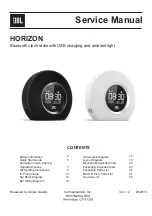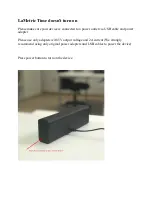
©
2002 RadioShack Corporation.
All Rights Reserved.
RadioShack and RadioShack.com are trademarks
used by RadioShack Corporation.
63-987
OWNER’S MANUAL — Please read before using this equipment.
Your RadioShack Atomic Projection Clock
combines a simple design with advanced
technology. You can set the clock to project
the current time on a wall or the ceiling for
easy nighttime viewing.
You can also set the clock to automatically
set the time and date, using a 60 kHz
longwave radio signal from radio station
WWVB. The clock checks the radio signal
several times each day and automatically
updates the time and date, providing the
most accurate time possible. Or, if you are
unable to receive the time-setting signal, you
can set the clock manually.
Large Liquid Crystal Display — makes the
clock easy to read. The current time and
alarm time, the time zone you are in, and the
date and day of the week appear on the
display.
Adjustable Projector — lets you project the
time on a wall or ceiling, rotate the image to
the desired angle, and focus the image for
clarity.
Three Languages — lets you review the day
of the week in English, French, or Spanish.
Display Backlight — lets you see all the
information on the screen, even in the dark.
Indoor Thermometer — lets you monitor the
room’s temperature.
+056#..+0)
"
$#66'4+'5
Your clock requires 2 AA batteries (not
supplied) for power. For the best
performance and longest life, we recommend
RadioShack alkaline batteries.
Cautions:
• Use only fresh batteries of the required
size and recommended type.
• Do not mix old and new batteries,
different types of batteries (standard,
alkaline, or rechargeable), or
rechargeable batteries of different
capacities.
1. Place your finger in the recess above the
battery compartment cover and lift off the
cover.
2. Place the batteries in the compartment
as indicated by the polarity symbols (+
and –) marked inside.
3. Replace the cover.
When the display dims, the clock stops
operating properly, or
ô
ô
ô
ô
(low battery icon)
appears, replace the batteries.
Warning: Dispose of old batteries promptly
and properly. Do not burn or bury them.
Caution: If you do not plan to use the clock
with batteries for a month or more, remove
the batteries. Batteries can leak chemicals
that can destroy electronic parts.
Note: Installing batteries resets the clock.
75+0)
"
#%
"
219'4
You can save battery power by using the
supplied 3V, 200 mA AC adapter to power
the projector. Be sure to install batteries to
power the clock, as the AC adapter does not
power the clock.
Cautions:
You must use a Class 2 power
source that supplies 3V DC
and delivers at least 200 mA.
Its center tip must be set to positive and
its plug must fit the clock's
DC 3V
jack.
The supplied adapter meets these
specifications. Using an adapter that
does not meet these specifications could
damage the clock or the adapter.
• Always connect the AC adapter to the
clock before you connect it to AC power.
When you finish, disconnect the adapter
from AC power before you disconnect it
from the clock.
1. Plug the AC adapter’s tip into the clock’s
DC 3V
jack (in the recess on the bottom
of the clock).
2. Route the adapter’s cord through the slot
marked
DC 3V
on the back of the clock.
3. Plug the AC adapter’s other end into a
standard AC outlet.
$#5+%
"
12'4#6+10
As soon as you install the batteries, all
display segments briefly appear.
7Cý'(0&&
7Cý'(0&&
7Cý'(0&&
7Cý'(0&&
,
the seconds,
'Cý':
'Cý':
'Cý':
'Cý':
(January 1), and the
current indoor temperature appear.
For about 3 minutes after you connect power,
the clock scans for a radio signal and
÷
flashes. When the clock receives a strong
signal, it automatically sets the time and date.
The clock checks the radio signal six times a
day, at about 2:00 AM, 3:00 AM, 4:00 AM,
9:00 AM, 3:00 PM, and 9:00 PM (as shown
on the clock).
Notes:
• On very cloudy and stormy days, the
signal might not be strong enough to
reset the clock. If the clock does not
receive a strong radio signal, you can set
the time and date manually. (See
“Manually Setting the Time, Date, and
Language” on Page 2.)
• If the clock does not receive a strong
signal within about 2 minutes, it stops
scanning and looks for a signal again at
the next preprogrammed time.
The time zone
FFFF
(Pacific),
C
C
C
C
(Mountain),
9999
(Central), or
;;;;
(Eastern) appears in the map
on the right of the screen. While the clock is
scanning for a signal, repeatedly press
ZONE
until the desired time zone is highlighted.
Your clock measures and displays the indoor
temperature between 23° and 122°F (–5° to
50°C). If the temperature goes above or
!
((SNOOZE))
CLOCK
8 9
ALARM
ZONE
#VQOKE
"
2TQLGEVKQP
"
%NQEM





















